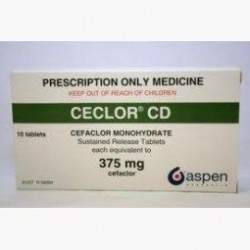Ceclor CD (cefaclor) Coupons, Discounts & Cost
Ceclor CD (cefaclor) is a cephalosporin antibiotic with bactericidal properties. One way to save money on the Ceclor CD (cefaclor) retail cost regardless of income and insurance status is to use Ceclor CD (cefaclor) coupons or discount cards from RXCoupons. Use this Ceclor CD (cefaclor) coupon at this online pharmacy and receive up to 75% off the sale price.
Ceclor CD (cefaclor) - general information
Ceclor CD (cefaclor) is a cephalosporin antibiotic with bactericidal properties. It is highly active against certain types of gram-negative bacteria and gram-positive organisms. Cefaclor is not active against Pseudomonas species, most strains of enterococci, strains of Enterobacter cloacae and Listeria monocytogenes.
Ceclor CD (cefaclor) - indications for use
Ceclor CD (cefaclor) is used to treat bacterial infections of the upper and lower respiratory tract, urinary tract, skin and soft tissues; otitis media, osteomyelitis, endometritis, gonorrhea.
Possible contraindications associated with Ceclor CD (cefaclor)
Do not use this drug if you have hypersensitivity to penicillins and cephalosporins. It is not recommended for use in children up to 1 month.
Use with caution in case of electrolyte imbalance, bronchial asthma, severe liver disease, malabsorption syndrome.
How to take Ceclor CD (cefaclor)
The daily dosage of the drug is set individually after consultation with your doctor.
Cefaclor is usually administered in a dosage of 750 mg per day, divided into 3 doses.
The course of treatment usually lasts for 7, maximum 10 days.
Use in children: the drug is contraindicated in children under the age of 1 month. The maximum daily dose for children is 40 mg/kg.
Adults: 250-500 mg 3 times a day. The highest daily dose is 4 g. The highest single dose is 500 mg.
Potential side effects referred to Ceclor CD (cefaclor)
Treatment with Ceclor CD (cefaclor) can lead to the development of unwanted side effects: neutropenia, aplastic anemia, thrombocytopenia, leukopenia, constipation, indigestion, epigastric pain, hepatitis, jaundice, anxiety, paresthesia, confusion, fatigue, sleep disturbance, allergic reactions, itching in the genital area, dyspnea, angioedema, allergic conjunctivitis, bleeding, dizziness, loss of appetite, increased sweating, hallucinations, nephritis, urinary retention, vaginitis, disorders of kidneys, Stevens-Johnson syndrome, anaphylaxis, eosinophilia, Lyell's syndrome, superinfection, hyperasotemia, hypercreatininemia, candidiasis and mycoses. Central and peripheral nervous system: headache, dizziness. Hematopoietic system: leukopenia, thrombocytopenia, hemolytic anemia, eosinophilia, hypoprothrombinemia. Digestive system: nausea, vomiting, diarrhea, cholestatic jaundice, pseudomembranous colitis, elevated liver transaminase levels, hepatitis. Dermatological reactions: rash, hives, itching. Urinary system: interstitial nephritis. The most commonly observed side effects in case of overdose: nausea, diarrhea and vomiting.
Possible drug interactions associated with the use of Ceclor CD (cefaclor)
Ceclor CD (cefaclor) should be used with caution with aminoglycosides, metronidazole, polymyxins, rifampicin, chloramphenicol, tetracyclines.
Aminoglycosides and polymyxins may increase the risk of nephrotoxicity.
Probenecid slows the elimination of the drug.
Chloramphenicol reduces the antibacterial effect of the drug.
Combined therapy with phenylbutazone is not recommended.
Metronidazole and rifampicin may increase the effectiveness of cefaclor.
Concomitant administration with teriflunomide is not recommended.
The drug should not be combined with ethacrynic acid (high risk of complications).
Cefaclor reduces the production of vitamin K. Therefore, concomitant administration with salicylates, nonsteroidal anti-inflammatory agents, and sulfinpyrazone may increase the risk of bleeding.
Cholestyramine reduces the absorption of cefaclor.
What should I know about Ceclor CD (cefaclor) special instructions?
Ceclor CD therapy may cause a false positive Coombs test.
Caution should be observed when treating patients with kidney disease. Ceclor CD should not be used in patients with malabsorption syndrome and those who are allergic to penicillin.
Recommended storage conditions for Ceclor CD (cefaclor)
Ceclor CD tablets should be stored in a dry place, away from children, at a temperature not exceeding 25°C.

